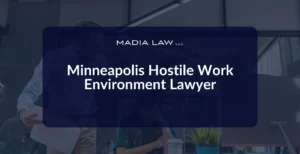
A hostile workplace can cause massive disruptions to your job, health, and income. If you find yourself facing repeated insults, offensive comments, or retaliation at work, the damage often extends beyond standard stress; it severely impacts how you live and work each day.
These adverse conditions can mushroom into a legitimate and serious legal issue when the mistreatment starts to cause fear, anxiety, or humiliation, and your employer fails to act.
At Madia Law LLC, we have helped employees in the Twin Cities and across Minnesota challenge discrimination, retaliation, and workplace harassment. As experienced Minneapolis hostile work environment lawyers, we understand what you are being put through, and we are here to help you take action with confidence.
If something feels off at work, you are probably not imagining it, and if you do decide to push back, you do not have to go to battle without the proper support.
Why You Need a Hostile Work Environment Lawyer
Workplace harassment that crosses legal lines rarely begins with or is pinned on a single event. It often builds over a stretch of time, such as increasingly vulgar comments, exclusion from meetings, or pressure after speaking up. The result of this progression is mental exhaustion, anxiety, fear, and confusion regarding what may come next.
If your employer stays silent while the mistreatment continues, the issue becomes more than just an uncomfortable circumstance; it escalates into a likely legal violation. And waiting too long to address it can weaken your case and chance of getting justice.
At Madia Law LLC, our expert Minneapolis employment attorneys help workers in Minnesota take control of hostile employment environment situations early. Here is how we support you:
- Track the pattern of abuse before emails are deleted or memories fade
- Protect your position during HR talks, resignations, or performance reviews.
- Respond immediately when your employer refuses to intervene or retaliates.
For a legal consultation with a hostile work environment lawyer serving Minneapolis, call 612-349-2729
What a Minneapolis Hostile Work Environment Lawyer Will Do for You
When you are dealing with harassment, retaliation, or discrimination, it is not easy to know what to do next. A Minneapolis hostile work environment lawyer gives you direction, protects your rights, and takes action when your employer won’t.
Every step matters. We make sure you take the right ones toward a successful case outcome.
Evaluate and Investigate Claims
We begin by reviewing your records, emails, messages, and reports to gain a clearer understanding of what happened.
Then we identify patterns of behavior, key people involved, and whether your employer knew or should have known about the negative environment.
We will confirm your timeline to file your claim aligns with the strict legal deadlines of the EEOC and/or other Minnesota agencies.
Preserve Evidence and Protect Legal Rights
We help you secure the records that matter, including emails, texts, reviews, and written complaints.
We advise you on what to avoid, such as quitting too soon or signing documents under pressure. Preserving this evidence early gives your case the firm foundation it needs to weather legal scrutiny and succeed.
File Complaints (EEOC, MHRA)
We complete and submit official filings to agencies like the EEOC or MDHR with precision and care. Most claims must be filed within 300 days, so timely filing is crucial. We carefully review every detail to ensure your case progresses smoothly without any setbacks.
Handle Retaliation, Wrongful termination, and Lost Wages
Retaliation often takes the form of sudden demotions, exclusion from meetings, or termination following the reporting of workplace misconduct. These actions violate not only internal company policy but also federal and state laws.
We move quickly to hold your employer accountable and recover lost income, benefits, and career opportunities.
Pursue Damages or a Settlement
We pursue full compensation for what you have endured, including lost income, emotional harm, legal expenses, and in severe cases, punitive damages.
Whether it is through a private settlement or a court case proceeding in Minnesota, we fight for a fair outcome that accurately reflects the impact this setback has had your life. The legal support process remains confidential from start to finish, with clear updates at every step.
Minneapolis Hostile Work Environment Lawyer Near Me 612-349-2729
How a Lawyer Helps You Prove a Hostile Work Environment Case in Minneapolis?
Not every unfair workplace meets the legal definition of a hostile environment. To move forward with a claim, certain specific legal standards must be met, and we help you determine whether these thresholds have been crossed.
We assess your experience against four key elements:
- Unwelcome Conduct: Behavior you did not invite or accept.
- Protected Class: Such as race, gender, age, disability, religion, or sexual orientation.
- Severe or Pervasive Mistreatment: Whether it was more than a single incident and to what degree the behavior affects your (and others’) ability to work.
- Employer Awareness: Your employer knew or should have known and failed to act.
We gather the solid proof that your claim needs: documents, timelines, and witness accounts. If the conduct shows a pattern tied to your identity, we systematically build out your case to meet the legal standard.
Click to contact our Employment Lawyers in Minneapolis for Workplace Legal Issues today
What Compensation Can a Lawyer Recover for You?
A hostile work environment can leave lasting emotional and financial damage. We work to recover the full value of what you’ve lost – income, mental health costs, and future job opportunities.
The amount of compensation you can recover depends on the particulars of your case. Here is how compensation is categorized by Minnesota’s employment law statutes and courts.
Lost Wages, Benefits, and Future Earnings
Our legal team calculates the full financial damage caused by workplace harassment, past losses, current setbacks, and future missed earnings.
- Back Pay: Missed wages for up to 12 months or more, depending on your case.
- Front Pay: Income replacement if you cannot return to your job.
- Lost Benefits: The value of health insurance, bonuses, or retirement matches.
- Missed Raises or Promotions: Career growth you were denied due to retaliation.
Every amount is analyzed and documented, so nothing that you might be owed is overlooked or omitted.
Emotional Distress and Mental Health Costs
Workplace harassment can take a serious toll on your mental health, and that emotional harm has legal weight worthy of recompense.
We help you recover costs tied to stress, trauma, and psychological impact.
- Therapy and Treatment Expenses: Counseling sessions for anxiety, burnout, or PTSD.
- Medication Costs: Prescribed treatments for depression, insomnia, or panic symptoms.
- Psychological Evaluations: Expert reports that support and validate your claim.
We connect medical records to your hostile experience endured while at work, so that emotional damages are documented and compensated.
Legal Fees and Punitive Damages in Severe Cases
In cases of willful misconduct or retaliation, we seek additional compensation beyond lost wages or benefits.
- Punitive Damages: Awarded to punish serious violations and deter future misconduct.
- Legal Fee Recovery: To shield you from being burdened by the cost of pursuing justice.
When the facts discovered are in support of your cause, we will tirelessly pursue these outcomes to send a clear message to your employer and opposing counsel that we are serious about protecting your future.
Complete a Case Evaluation form now
Who Can Be Held Liable in a Hostile Work Environment Case?
Employers are often the first to be held legally responsible, but they are not always the only ones shouldering blame. We help you identify all liable parties, including supervisors, HR managers, and even third parties like contractors or clients.
Forming a strong client case starts by knowing who allowed the mistreatment and who failed to stop it.
Employer’s Supervisor Harassment
Employers are legally liable when a supervisor’s harassment leads to job loss, demotion, or negative reassignment. Under Title VII of the Civil Rights Act, companies face strict liability if the harassment causes a major employment action.
Even without direct action, silence can create liability. We evaluate your employer’s response or failure to respond in order to hold them accountable.
HR Managers and Coworkers Under Minnesota Law
Minnesota law allows coworkers and HR managers to be held personally liable for harassment.
Under the Minnesota Human Rights Act (MHRA), they can face legal consequences for direct misconduct or for failing to act when abuse occurs.
We examine each person’s role to determine who can be named in your claim.
Third Parties (Clients, Vendors, Contractors)
Outside parties, such as clients, vendors, or contractors, can contribute to a hostile work environment. Employers carry legal responsibility when they ignore warning signs.
We assess how your employer responded and what steps they took (or did not take) to course correct once the misconduct became clear.
Legal Grounds to Sue After Reporting Workplace Harassment
If your employer punished you for reporting harassment, you may have a valid legal claim. We identify violations under federal and Minnesota law based on how your employer reacted and whether retaliation occurred after your report.
Your experience may meet the legal threshold for a lawsuit.
When Employer Retaliation Justifies a Lawsuit
Retaliating against you for reporting misconduct is illegal. If you were demoted, excluded, or fired after speaking up, you may have a strong retaliation claim. We prove the link between your complaint and your employer’s response.
To establish retaliation, we show:
- You made a protected complaint.
- You experienced a negative job action.
- There is a clear connection between the two.
We collect timelines, emails, statements, and records that confirm retaliation, not poor performance, caused the outcome.
When Constructive Discharge Qualifies as Termination
Quitting a hostile job does NOT mean you have given up on your situation; in fact, it may be that you were instead forced out. If conditions were so toxic that no reasonable person would stay, your resignation could be legally viewed as constructive discharge.
To prove it, we show:
- The environment was hostile or retaliatory.
- Staying became unreasonable.
- Your employer caused or ignored the problem.
When You Can File a Wrongful Termination Claim
You may have grounds for a wrongful termination claim if you were fired shortly after reporting harassment, opposing discrimination, or participating in a workplace investigation.
Common triggers for a wrongful termination claim include:
- Reporting misconduct to HR.
- Filing a formal complaint with the EEOC or MDHR.
- Requesting a legally protected accommodation.
We examine and assess the condition of your firing against Minnesota state and federal law to confirm if your rights were violated.
Federal and State Laws That Protect You from a Hostile Work Environment
Both Minnesota and federal laws protect workers from harassment, discrimination, and retaliation.
At Madia Law, we are well-versed in using these protections to build strong legal claims. The six most relevant laws include:
1. Title VII Of The Civil Rights Act of 1964
Prohibits workplace discrimination based on race, color, religion, sex, or national origin. Title VII supports most federal hostile work environment claims.
2. Minnesota Human Rights Act (MHRA)
Covers additional categories such as sexual orientation, disability, and marital status. MHRA applies to most Minnesota employers and allows claims for harassment or retaliation.
3. Minnesota Department of Human Rights (MDHR)
The MDHR enforces the MHRA and investigates complaints of discrimination and harassment. Workers in Minnesota can file through this agency as part of the legal process.
4. Age Discrimination in Employment Act (ADEA)
Protects workers aged 40 and older from harassment or adverse treatment due to age. Applies to most employers with 20+ employees.
5. Americans with Disabilities Act (ADA)
Protects employees with physical or mental impairments. Harassment, exclusion, or denial of reasonable accommodations can support a legal claim.
6. Family and Medical Leave Act (FMLA)
Provides job protection for qualified medical or family leave. If you are harassed or punished after taking FMLA leave, you may have grounds for a legal case.
Each of these laws offers protection in different ways. If you’re unsure which ones apply to your situation, you can review a full overview of the laws that protect you from unfair treatment at work.
If you believe your leave has resulted in workplace harassment or a toxic culture, a Minneapolis family and medical leave lawyer can help you protect your rights.
Why Choose Madia Law LLC for Your Hostile Work Environment Case in Minneapolis
At Madia Law LLC, we do not tolerate employer silence or inaction when your rights are violated. We stand proudly and resolutely with workers in the Twin Cities and across the Gopher State, because Minnesotans deserve respect, safety, and swift action.
What sets us apart:
- Focused on Worker Justice: We fight for employees facing harassment, retaliation, or discrimination. Every case we take reflects our belief that work should be respectful, and fair, and free of danger or threats.
- Clear, Honest Legal Advice from Day One: We do not overpromise. We walk you through your rights, your risks, your options, and your realistic chances of winning without pressure.
- Proven Results for Minneapolis and Across Minnesota Workers: Our track record includes hundreds of legal wins and significant recovery amounts for clients in Minneapolis and county courts throughout Minnesota. We prepare every case as if it is going to trial and go the extra mile to ensure satisfaction and justice for our clients.
What to Do if You’re in a Hostile Work Environment – Immediate Steps to Protect Yourself
Taking the right steps early protects your legal rights. If you are facing harassment, discrimination, or retaliation, small actions taken during the initial phases can shape the strength of your claim as it unfolds.
Follow these steps to build a record and protect yourself:
Document Every Incident and Preserve All Records
Start a written log that includes dates, times, names, and specific actions tied to each hostile incident. Save emails, text messages, performance evaluations, and written complaints that support your version of events. This documentation helps establish patterns and provides the evidence your claim will rely on.
Report Misconduct Through Internal HR Procedures
Follow your company’s reporting process before taking legal action. Submit a written report to HR that clearly outlines what happened, when it occurred, and who was involved. This step creates a formal record, allowing your employer to respond appropriately.
Consult an Attorney Before Resigning from Your Job
Get legal advice before quitting; resigning too soon may hurt your case. A Minneapolis employment lawyer will assess whether your situation meets the legal standard for constructive discharge or retaliation. They will also help you avoid critical mistakes like quitting without documentation or in an unfavorable manner (e.g. too early or while critical evidence is pending), which may weaken your position later.
File a Formal Complaint with the EEOC or MDHR
Filing with the right agency is the first step toward legal action. In Minnesota, you have up to 300 days to file a discrimination or harassment complaint with the EEOC or the Minnesota Department of Human Rights. This filing protects your rights and officially starts the clock on the legal process.
Schedule a Free Consultation with an Employment Lawyer
Talking with a skilled Minnesota employment lawyer early in your circumstance gives you a clear understanding of what is transpiring and confidence to act when conditions are in your favor. At Madia Law LLC, we review your situation, explain where you stand legally, and guide you on what to do next. There is no pressure or cost to get started.
What Constitutes a Hostile Work Environment in Minnesota?
A hostile work environment happens when repeated or extreme conduct makes it hard to do your job.
To qualify legally, the mistreatment must be based on a protected trait such as race, gender, disability, religion, age, or sexual orientation and must be severe or pervasive.
Under Minnesota’s MHRA and federal Title VII law, your employer is responsible if they knew or should have known and failed to act. One rude comment is rarely enough, but ongoing, targeted mistreatment often is.
What Behaviors Are Considered Criteria for a Hostile Work Environment in Minnesota?
Repeated mistreatment based on a protected trait may constitute a legally actionable hostile work environment. Under Minnesota and federal law, behavior that interferes with your ability to work or feel safe is not “just part of the job”—it is likely illegal and subject to prosecution.
These malicious behaviors in the workplace often meet the legal standard when they are persistent, targeted, and identity-based.
Repeated Verbal Abuse or Humiliation by Supervisors
Insults, yelling, or mockery from a supervisor can constitute workplace harassment if they occur frequently and persist over time.
When this verbal abuse damages your confidence or ability to work, and your employer ignores it, the law may treat it as a hostile work environment.
Discrimination Based on Race, Gender, Sexual Orientation, or Disability
Repeated unfair treatment tied to your identity can legally qualify as workplace discrimination. Overlooked assignments, biased reviews, or singling out based on race, gender, disability, or sexual orientation may violate Title VII or the Minnesota Human Rights Act.
Even subtle patterns, such as meeting exclusions or uneven evaluations, can support a legal claim if they occur consistently.
Sexual Harassment or Inappropriate Conduct
Unwanted touching, explicit jokes, or sexual remarks can qualify as sexual harassment if they create an intimidating or offensive work environment.
The law focuses on the behavior, not the gender, of those involved. Persistent sexual conduct, in person or in the online/digital realm, may give you grounds to file a legal claim.
Targeted Retaliation After Reporting Misconduct
Retaliation for reporting harassment or discrimination is illegal under Minnesota and federal law. It often shows up as exclusion, demotion, write-ups, or threats after you speak up. Even if your original complaint is still pending, these actions may form a new legal claim.
We hold employers accountable for punishing workers who report misconduct.
Isolation, Sabotage, or Threats Creating Emotional Distress
Being shut out, undermined, or subtly threatened at work can be just as damaging as overt harassment. Coworkers may stop speaking to you, exclude you from meetings, or remove responsibilities without reason. In other scenarios, you might be given unrealistic deadlines or false instructions, purposely setting you up to fail.
Anxiety, insomnia, and burnout are common and legally relevant when tied to harassment or mistreatment. If your employer knows what is happening and does nothing, the conduct may meet the legal standard for a hostile work environment.
FAQs About Hostile Work Environment Claims in Minneapolis
What’s the deadline to file a hostile work environment claim?
In Minnesota, you generally have 300 days to file with the EEOC or one year under the Minnesota Human Rights Act (MHRA). Missing these deadlines may prevent you from bringing a legal claim.
Will my employer retaliate if I take legal action?
Retaliation is illegal under both federal and state law. If you are punished for filing a complaint, that retaliation may justify a separate legal claim.
Do I have to quit to file a lawsuit?
No, you can file a lawsuit while still employed. The law protects workers who are actively engaged, not just those who have resigned or been terminated from their positions.
Can I sue if I’m still employed?
Yes, ongoing mistreatment can still support a legal claim. If the behavior meets the legal threshold, you do not need to leave your job to sue.
Speak with a Minneapolis Hostile Work Environment
Work should never feel unsafe or hostile. If mistreatment is affecting your health, income, or peace of mind, speak with someone who listens and acts.
At Madia Law LLC, we listen, explain your rights clearly, and help you decide your next legal steps. Consultations are confidential and free if your case fits our focus. Whether you’re exploring options or ready to act, we’re here to support you.
For guidance, call (612) 349-2729 or use our contact form to start a conversation that matters.
Call 612-349-2729 or complete a Case Evaluation form






